After such a stunning aria it is best to have a moment to reflect upon the words, the pristine sound that has come from such a powerful performer. The same should be applied to the Immigration discussion. Let us reflect, as my two previous posts have explained, the House of Representatives back in December passed a bill that dealt with border security on the issue of immigration. The House bill (HR 4437) would treat anyone in the country without a valid visa as a felon and severely punish those caught helping them. It has neither guest worker provisions nor a path to citizenship. The Senate bill is the direct opposite and includes some amendments. On May 25, the Senate voted, 51-47, to limit the number of guest workers who could stay in the country permanently. The amendment, by Jeff Bingaman, D-N.M., would limit the number of prospective immigrants who could get employment-based green cards to 650,000 each fiscal year. The total would include spouses and children. The underlying bill would have capped the green cards issued to those immigrants at 450,000, but it did not include their spouses and children. Another amendment, by John Ensign, R-Nev., would bar illegal immigrants from collecting tax refunds or filing claims for the earned income tax credit or other benefits for tax years prior to 2006. It was adopted, 50-47, on May 25.
All that comity after such a rocky start. The prospects for a bill nearly crashed in April over procedural differences and were revived only after Bush brought a bipartisan group to the White House for a pep talk and followed up with a prime-time nationally televised address calling for Congress to act. Now, some senators are saying Bush needs to step even further into the fray. “The time has come for very active participation by the president,” said Judiciary Chairman Arlen Specter, R-Pa., who managed the bill on the floor. “The American people are watching to see if Congress can govern, and I believe the president will put a very heavy shoulder to the wheel. . . . I predict success.” House GOP critics of the Senate bill provided a reminder of why finding a compromise will be so difficult. “It’s hard to justify legislation that would reward millions of lawbreakers, attract more illegal immigrants and depress American workers’ wages,” said Lamar Smith, R-Texas, an influential member of the House Judiciary Committee. “The Senate bill may be good for other countries and foreign workers, but it’s not good for America and American workers.” Really? In my first post on immigration, I mentioned that I had my goggles on snugly. I certainly hope so, for I am about to crash against the wave.
Let us be clear, we need to be tough on illegal immigration, but we need to be tough on the causes of illegal immigration.
Instead of using tired soldiers already strained from service overseas to watch our borders the government should see that a big portion of congressional monies given to the Department of Homeland Security is marked for the hiring of more Border Patrol Officers (estimate at least 160,000) as well a smaller portion for technology. I do not mean special laser gadgets or sensors; walkie-talkies that work across long distances will do just fine. More people on the border, covering the large expanses of desert, will be both a psychological deterrent and emotional boost for American citizens worrying about border security. Businesses need to be held more accountable by the government. My post yesterday indicated loopholes and a certain mentality that has existed for many years between the government and businesses that employ illegals as well as between illegals and business. Labor that is affordable to business often has meant cheap. It is time that cheap means responsible too. Finally, and this will upset some people who might fall upon this blog, but if America is be honest about immigration we need to look at the whole picture. The majority of illegal immigrants come from the Hispanic world, Mexico, to be exact. The US government should work more closely with the Mexican government and find economic ways to elevate the level of poverty, low-wages, and unemployment in northern Mexican states and urban cities that are often the very causes for such illegal activity. A strong Mexican economy benefits the United States. This was the rationale behind NAFTA. The Bush Administration has a unique opportunity, especially with President Bush’s prior experience as a governor of border state, to assist Mexico. As of this moment, a guest worker program, no matter duration is the best option. Massive deportation is as unpractical as it is soundly un-American. What has been the central pillar of our American ideals, a guiding tenant preached under the Capital dome; our chapel to democracy has been compromise. Over the years the compromises made have defined who we are as a people—good and bad—but the silver lining through two-hundred sixty plus years has been most distinguishable, we have always become a stronger people. Let us hope our elected officials remember their history.
Tuesday, May 30, 2006
Monday, May 29, 2006
An Aria on Immigration
 As with any good opera we shall hear a stunning aria. The same can be said regarding our current Immigration discussion. The central question one needs to ask regarding the immigration discussion is who carries the burden?
As with any good opera we shall hear a stunning aria. The same can be said regarding our current Immigration discussion. The central question one needs to ask regarding the immigration discussion is who carries the burden?More than 10 million illegal immigrants live in the United States, and 1,400 more arrive every day. Once concentrated in a few big states like Texas and California, they are rapidly moving into non-traditional areas such as the Midwest and South. Willing to work for low wages, the migrants are creating a backlash among some residents of the new states, which have seen a nearly tenfold increase in illegal immigration since 1990. While illegal immigrants only make up about 5 percent of the U.S. work force, critics of the nation's immigration policies say illegal immigrants take Americans' jobs, threaten national security and even change the nation's culture by refusing to assimilate. But immigrants' advocates say illegal migrants fill the jobs Americans refuse to take and generally boost the economy. Proposals to deal with illegal immigration include the Real ID bill, which would block states from issuing driver's licenses to undocumented immigrants, and “guest worker” programs granting temporary legal status to illegal workers.
Let us talk about enforcement (security) and business. A central fact of immigration enforcement, though, is that business must be a willing participant and not an impediment. By screening its job applicants, even with the help of government databases, business becomes part of the enforcement mechanism. In fact, the system would become largely self-enforcing. Without corporate cooperation, the government could resort to raids and severe penalties, but it would face long odds. The key to gaining that cooperation, and by extension any real success in controlling illegal immigration, is in the many details that members of Congress are trying to negotiate into an overall immigration bill. What exactly would business have to do? How strict would enforcement be? To what extent would business be liable for errors? How much would the government, and government-sponsored technology, be able to help separate legal from illegal job applicants and discover well-forged work documents?
Congress does not have an encouraging history in this area. Enforcement provisions of the 1986 immigration law — the last major change in policy — were weakly worded and poorly enforced. In fact, studies by both the Government Accountability Office (GAO) and the Congressional Research Service (CRS) have found that workplace enforcement over the past decade has been almost non-existent. When Congress has had an opportunity to strengthen the law, it hasn’t. Instead, lawmakers have intervened to in effect shield companies from aggressive enforcement by immigration authorities, with the argument that immigration raids have run off workers and hurt local economies.
The House and Senate disagree about how the system should work and whether businesses should receive inducements to cooperate. Business leaders say they would be willing to go along with the verification system proposed by the Senate, but not without something in return. They want assurances that they would continue to have access to large supplies of low-wage workers, through the kind of guest worker program that President Bush has proposed. House Republicans say business is in no position to make demands, however. They are standing by their enforcement-only approach, which would require businesses to verify the legality not only of new workers but also of those already on the payroll. The House would not authorize a guest worker program. “All you need to do is have a couple well-publicized raids, where an employer has a $12.5 million dollar fine, and you will see a lot less” hiring of illegal immigrants, said Republican F. James Sensenbrenner Jr. of Wisconsin, the chairman of the House Judiciary Committee and the sponsor of the House measure. Some business lobbyists say that unless Congress provides a secure verification system and guest workers, they will be content to let the immigration legislation die this year and try again after the elections. That is partly false bravado. A number of states have enacted their own workplace enforcement laws, and big companies will have to contend with a patchwork of differing statutes if Congress doesn’t pass an overriding federal law soon.
All this points to an unworkable system. “We can write all the laws we want,” said Sen. Richard J. Durbin of Illinois, the Democratic whip. “But you need to have an administration that says we will now enforce those laws. And there has been a dramatic decline in enforcement with this administration.” Well, not quite. Even when Congress has tried to get tough with workplace enforcement, business has managed to get its way. The 1986 law requires employers to complete a government document known as Form I-9, on which they verify that they have looked at and feel confident in workers’ documents showing that they have the right to employment in the United States. In 1997 the U.S. Commission on Immigration Reform found that fake documents make it easy for illegal immigrants to find work. A number of GAO reports have underscored the widespread fraud. Even jobs that could pose security risks, such as those at airports, nuclear plants or military bases, have been obtained by illegal workers, according to a 2004 GAO report. Sporadic evidence and congressional testimony show that some companies just turn a blind eye to document fraud. Each year, the IRS receives tens of thousands of W-2 wage statements with inaccurate or completely bogus Social Security numbers.
This all leads to a bigger question and the topic of this post. Who carries the burden? From all the evidence provided and all the reading an informed individual must admit that it is the immigrants, after all, who carry the burden. Not businesses that use them for cheap labor or Congress that use them for photo opportunities and campaign platforms and certainly not pundits who have received their thirty-seconds of fame at an immigrant’s expense. The next question that will be discussed tomorrow is what is practical and smart? The answers are not necessarily simplistic but certainly better than the alternatives being voiced.
Much of my sourcing came from: http://library.cqpress.com/
Sunday, May 28, 2006
Immigration
Realizing the ocean of opinion, emotion, and true faith in beliefs that for this particular issue amount to nothing short of ideology I wade into the Immigration discussion with my goggles snug over my eyes.
Yes, in a series of posts on the subject, I have decided to hit, head-on, the waves of rhetoric of this discussion, and lets be honest, that what this should be--a discussion of ideas. Unfortunately it has not become so.
Similar to acts in an opera this is becoming just as tragic. First, the pundits talked, the immigrants and their supporters marched, then the "minute-men" marched, and Congress realizing they had little to show of accomplishment before they recessed for the summer, which this being the year 2006, means elections in November, where almost all of them are up for reelection, decided to act. The president attempting, in a rare, display of pragmatism; split the difference by addressing the nation, proposing a guest-worker program--path to citizenship--and the use of National Guard troops on the border. This has led to the second act, opening with the House of Representatives passing a bill that would almost require the deportation of every illegal immigrant in the nation. Granted the House did not address the issue of comprehensive immigration like the president had, but with so many constituants back home smelling blood, they had to throw some kind of red meat at the masses. Now the United States Senate took up the issue of immigration, attempting to follow the intent of the president's speech, while calming their siblings in the other chamber. A vote of 62-36 favoring an overhall of immigration laws, passed this past Thursday. The Senate bill (S 2611) deals with four major issues in the immigration debate: border security, interior enforcement, guest workers and the estimated 12 million illegal immigrants now in the country. It differs markedly from the bill (HR 4437) the House passed in December, which included no provisions on guest workers or legalization of those who are already in the United States. The response of the siblings across the hall? Wails of indignation. As one senior Represenative said, "according to what's going on now, in calling it a pathway to citizenship or earned legalization, is not honest because it is amnesty." This from Rep. James Sensenbrenner, R-Wisconsin, chairman of the House Judiciary Committee who is running for reelection in November. For a brief summary of the Senate bill: http://www.cnn.com/2006/POLITICS/05/26/immigration/index.html
Both chambers now see the Senate bill (S 2611) as DUA, dead upon arrival, to the conference room where both bills are to be reconciled. Back in the House, Rep. Mike Pence is editing his own version of an immigration bill that would not offer any "amnesty" and leave the operating of any guest-worker program to the private sector. To see the full context of the speech that he gave at the Heritage Foundation where he introduced his ideas on immigration reform, please go to: http://mikepence.house.gov/News/DocumentSingle.aspx?DocumentID=44113
Upon reading his remarks and his proposed bill I will not be cynical in this post. My intent for this blog is to be non-partisan and apolitical. However, let me bend my own rule a bit to make this one comment. I wonder what Mr. Pence's dead Irish immigrant forebearers are thinking of him now?
The one question that no one has asked, except my wife, is this: why? Why this issue and more importantly why now when we have so many more important issues to discuss like health care, the national debt, our various trade deficits, Iran and, of course, Iraq?
Since we are not discussing the above issues, rather we are focusing on having a dicussion on Immigration let us turn our attention to an important question hardly asked, but essential to this discussion: Who Carries The Burden?
Yes, in a series of posts on the subject, I have decided to hit, head-on, the waves of rhetoric of this discussion, and lets be honest, that what this should be--a discussion of ideas. Unfortunately it has not become so.
Similar to acts in an opera this is becoming just as tragic. First, the pundits talked, the immigrants and their supporters marched, then the "minute-men" marched, and Congress realizing they had little to show of accomplishment before they recessed for the summer, which this being the year 2006, means elections in November, where almost all of them are up for reelection, decided to act. The president attempting, in a rare, display of pragmatism; split the difference by addressing the nation, proposing a guest-worker program--path to citizenship--and the use of National Guard troops on the border. This has led to the second act, opening with the House of Representatives passing a bill that would almost require the deportation of every illegal immigrant in the nation. Granted the House did not address the issue of comprehensive immigration like the president had, but with so many constituants back home smelling blood, they had to throw some kind of red meat at the masses. Now the United States Senate took up the issue of immigration, attempting to follow the intent of the president's speech, while calming their siblings in the other chamber. A vote of 62-36 favoring an overhall of immigration laws, passed this past Thursday. The Senate bill (S 2611) deals with four major issues in the immigration debate: border security, interior enforcement, guest workers and the estimated 12 million illegal immigrants now in the country. It differs markedly from the bill (HR 4437) the House passed in December, which included no provisions on guest workers or legalization of those who are already in the United States. The response of the siblings across the hall? Wails of indignation. As one senior Represenative said, "according to what's going on now, in calling it a pathway to citizenship or earned legalization, is not honest because it is amnesty." This from Rep. James Sensenbrenner, R-Wisconsin, chairman of the House Judiciary Committee who is running for reelection in November. For a brief summary of the Senate bill: http://www.cnn.com/2006/POLITICS/05/26/immigration/index.html
Both chambers now see the Senate bill (S 2611) as DUA, dead upon arrival, to the conference room where both bills are to be reconciled. Back in the House, Rep. Mike Pence is editing his own version of an immigration bill that would not offer any "amnesty" and leave the operating of any guest-worker program to the private sector. To see the full context of the speech that he gave at the Heritage Foundation where he introduced his ideas on immigration reform, please go to: http://mikepence.house.gov/News/DocumentSingle.aspx?DocumentID=44113
Upon reading his remarks and his proposed bill I will not be cynical in this post. My intent for this blog is to be non-partisan and apolitical. However, let me bend my own rule a bit to make this one comment. I wonder what Mr. Pence's dead Irish immigrant forebearers are thinking of him now?
The one question that no one has asked, except my wife, is this: why? Why this issue and more importantly why now when we have so many more important issues to discuss like health care, the national debt, our various trade deficits, Iran and, of course, Iraq?
Since we are not discussing the above issues, rather we are focusing on having a dicussion on Immigration let us turn our attention to an important question hardly asked, but essential to this discussion: Who Carries The Burden?
Saturday, May 27, 2006
Da Vinci Code

I have decided to post something lite for today. Talking to our neighbors last week my wife and I decided to spend a few hours over Memorial Day weekend and see the Da Vinci Code.
I had read the book recently, probably the last person in this country, as had our neighbor's spouse. My wife and our neighbor had not, so after agreeing on a time and mode of transportation--we walked--the four of us saw the movie.
This blog will not be a critique. The web is full of them, posts, editorials, live webcasts, etc. on this subject. Rather, I am going to say two things.
The first of which is that the screenwriter, Akiva Goldsman did an excellent job! If one is to believe what has been in the news months before its release having a screenwriter not consult the author of the book that the film is based on is heresay, on the level that this particular book postulates. With that said, the writing and thus the film, follow the book religiously. How flashbacks, memories, internal conversations characters have with themselves, to an impressive ghost-like transformation of London from 2006 back to the nineteenth-century smoothly jump from page to screen is truly remarkable. Word of advice to J.K. Rowling--hire this guy to transform your 900+ book five to the silver screen. Heavy subject matter was dealt with professionally, least we say reverently, leaving the viewer the opportunity to be entertained by the tale. And folks that is what it is.
Second, the issues addressed in the book and likewise on screen deal not with religiousity or theology, but rather the lesson, if there is one to be taught, about belief. The main character Robert Langdon mentions this to his counterpart at the very end of the film. For those viewers out there who have strong beliefs, this movie will not change anything. For those viewers who read the book and got caught up with the hysteria, there was just enough time between initial book publication and blockbuster release for logic to reasert itself. The movie will not change that either. What the movie will do that is productive and that the hyseria did not is force an inner dialogue within oneself from which stems individual faith.
Friday, May 26, 2006
Reflective Memorial Day
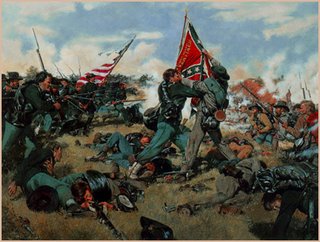 On the eve of the Memorial Day weekend I am in a reflective mood. Like most holiday's it has become over commercialized. On the calendar, most people look forward to it because of the vacation implications and the time it affords one to spend with friends and family. Citizen's less civic minded see a four day weekend as two opportunities: an extra day off of work and a extra day to eat and drink more than the previous year. In this respect, Memorial Day has become no different than Thanksgiving or to sound a bit irreverent, Christmas.
On the eve of the Memorial Day weekend I am in a reflective mood. Like most holiday's it has become over commercialized. On the calendar, most people look forward to it because of the vacation implications and the time it affords one to spend with friends and family. Citizen's less civic minded see a four day weekend as two opportunities: an extra day off of work and a extra day to eat and drink more than the previous year. In this respect, Memorial Day has become no different than Thanksgiving or to sound a bit irreverent, Christmas.The day was started to honor those who fought to preserve the Union back in 1861 when thirteen southern states seceded after the election of Abraham Lincoln. Subsequent generations have forgotten this point ceding it to a historical footnote and when Veteran's Day became a national holiday, the meaning and significance of both blurred into one holiday "where we honor those in uniform" and wave the American flag.
In the present context of this nation engaged in a global war I find it particularly poignant to remember. I do not wish to discuss foreign policy but rather would like to issue a request. This weekend after ones journey has safely and successfully been completed, the first drink consumed and small talk begun, take a silent moment to reflect sometime this weekend. To those of us in geographic locations with warm temperatures think about those Civil War soldiers in wool uniforms, to those with rain this weekend think of European trenches and the jungles of Asia, to those in cold temperatures, our grandfather's frostbite in the Ardennes forest and at the Chosen Reservoir. Also, those of us where the weather is unpredictable regardless of state of the art satellite meteorology, think to our men and women overseas sweating under the oppressing day time sun while shivering at night. Finally, take a moment to reflect upon those who have died.
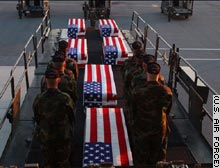
Thursday, May 25, 2006
The Human Stain

This week, Lakhdar Brahimi, a UN official, went to Sudan to try to persuade the government in Khartoum to let a UN peacekeeping force into its western Darfur region. Violence has persisted there since a peace deal between the main rebel group and the government was signed three weeks ago.
It is sad that such news once more has been heard, read, digested by the concerned world and forgotten. There is ambivalence to be sure about Sudan not only geographically speaking for many Americans but also psychologically and financially. A relative of mine bluntly informed me a couple of years ago (unfortunately, Sudan has been in the news for almost a decade) when we were discussing Sudan, the trouble in Darfur, and the massive humanitarian aid issue throughout the country that he did not care. My face must have registered my initial shock and confusion and he explained that he was more concerned with domestic issues and could not understand a problem overseas when the problems in this country were not being addressed first. I sympathized with him, took a sip of my beer and we moved onto another topic. Rest assured I was not weak nor was I a coward. I have for the better part of four years been stressing the need for action, ANY action to be taken in Sudan. This particular relative had heard my comments before and so I decided to spare him a rebuttal.
The very basic issues that form the core of the problems facing the people of Sudan, the refugees of Darfur, and the citizens of Sudanese border nations should not be brushed aside. Water IS important. Food IS important. Shelter AND protection against the hot African sun and the rape gangs and militia ARE important. Diplomacy can be a force for good and it can also be used for unsavory purposes--stalling decisions, gaining additional time for military preparation, etc. The diplomacy that has occurred at the United Nations, including the varying degrees of engagement between the Warring factions within the country that has produced muddled language praised in the International press, but that does not do anything for the Sudanese people, that very language is supposed to protect. Hence, the continued violence. A peace deal is only effective if it can be enforced. The African peace keeping force has shown that its size and ambiguity of its mission perimeters can not be the enforcing instrument that powerful countries like America and the EU had hoped.
Intervention from both the EU and the United States is needed! I can not stress this enough. A problem initially thought of and equally dismissed as an "African" problem has become a "humanity" issue. Our actions in Sudan will long be remembered on the scale of our actions after World War Two with the discovery of the Holocaust. The longer we wait the greater the stain upon those who were in positions of power and influence to act as well as those of us who cared.
Wednesday, May 24, 2006
A Gamble Worth Making

The world with all of its troubles seems to be moving towards conflict with Iran. A problem, created from issues, of both countries choosing, mind you, but as the diplomat's talk the rest of the world waits with fingers crossed that nothing goes wrong. In brief, Iran wants nuclear power. Most of the world, the US, in particular, is categorically against it. Iran in recent months has raised the level of rhetoric and continued its scientific attempts. After some reading and thoughtful analysis I wish to offer President Bush a suggestion.
Meet Iran's hardline president, Mahmoud Ahmadinejad. Look him in the eyes and into his soul (It worked with Mr. Putin). Accept his letter as an olive branch.
You, sir, have made your reputation based on gambles. Your first run for Texas governor, the White House (when your own father expressed hope that your brother, Jeb, would carry on the political tradition) and as president you have vacationed and campaigned in varying degrees throughout 2001, 2002, 2004, and 2005 against the advice of your staff, newspaper columnists, and presidential historians.
This is a gamble. The stakes, as with anything in politics, particularly international politics, are high. The rewards are equally large. First, you will have the opportunity to meet a man and get a "gut" reaction, something your morning intelligence briefings can never come close to. Second, from an ideological (political and religious) point of view, after this meeting, whatever is agreed upon will not be accepted by the Radical clerics in Iran (the real rulers of the country) which will give you two strategic options. 1. Take a tactical retreat from the likely criticism of the right-wing of your party and 2. Turn the rebuff into propaganda points not only in the US but in every moderate Muslim country in the world fighting against radical (fundamentalist) Islam. Basically, you can say, "we tried for peace, but they did not want it."
Since any such meeting would be a nightmare to agree upon if held in the US or in Iran, use a page out of President Reagan's playbook with the old Soviet Union. Meet somewhere neutral. President Reagan did not travel to Moscow to meet with President Gorbachev, rather the two met in Reykjavik. In this case, neutral, means also symbolic, thus: Istanbul, Turkey. In one swift stroke you assist in that country's continued bid for EU membership (Brussels can not look down on such a "player" now) appease the moderates AND the radicals in that country, tip your hat to Iran's religious symbolism and sensibilities, while preserve a psychological element that such a meeting is still occurring in the "west" and not say in Jordan or Egypt (not to say both those countries would not be good too).
Of course, the ultimate reward from such a gamble, Mr. President is that upon meeting Mr. Ahmadinejad you can reach an agreement, resolve the brewing conflict, and move onto other issues, foreign and domestic.
Legacy
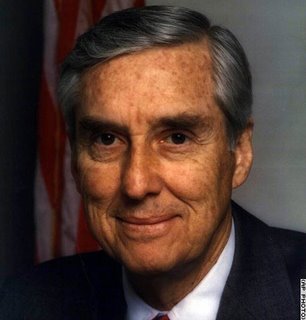
Lloyd Bentsen, a former congressman, senator, vice presidential candidate and treasury secretary, died Tuesday at his home in Houston, Texas, his family announced. He was 85.
Secretary Bentsen was an expert on such bread-and-butter issues as tax legislation, interest rates and health care. After retiring from the Senate in 1993, Bentsen joined President Clinton's Cabinet as treasury secretary. He held the job for two years, during which he advocated for the North American Free Trade Agreement, cutting capital gains taxes and making the country more competitive in the international marketplace.
Politic's is a tough profession. Secretary Bentsen was considered by friend and opponent alike as a decent man.
A friend of mine who was intimately involved with Democratic politics throughout much of the last thirty years, a former Congressman, spoke nicely of him and of the legacy Bentsen left. I wonder about that word, its implications for our current politicians, as well as an electorate that is increasingly more partisan and bitter.
emersondarcy is back
Call it a sabbatical. I do not wish to think of it as laziness nor do I wish to explain my lapse of posting for over a month an extended holiday.
After several re-tooling sessions and the aid of a friend I am back to blogging. My confidence, though never really lacking, is nonetheless, restored, and I look to the future with hope that many months from now a visitor or a loyal reader will stop on this post in my archive and smile.
After several re-tooling sessions and the aid of a friend I am back to blogging. My confidence, though never really lacking, is nonetheless, restored, and I look to the future with hope that many months from now a visitor or a loyal reader will stop on this post in my archive and smile.
Wednesday, March 08, 2006
Democracy--Texas Style
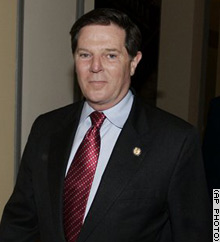
Despite being indicted and relegated to the backbenches, Rep. Tom DeLay's political stock remained strong enough with the folks back home for him to win Tuesday night's primary election in his Houston-area district. He will face Democrat Nick Lampson in the general election. The former congressman lost his seat in an adjacent district in 2004 after DeLay and his allies pushed a controversial reapportionment plan though the Texas Legislature, making Lampson's district more Republican.
Lampson, who ran unopposed in the Democratic primary, is expected to put up a nasty fight for DeLay's seat.
In pondering DeLay’s primary victory, one should ask the glaring question, why? Or better yet, how could this happen? A friend of mine once said, that people view Congress in general as corrupt, but their congressman as incorruptible. How then does one explain, when faced with the facts, the voters still chose to vote for a corrupt man to represent them in Congress. A man who with two associates are facing money-laundering charges for their alleged 2002 roles in funneling $190,000 in corporate donations from a political action committee to Republican candidates for state government, circumventing a Texas law banning corporate donations to political campaigns.
The rule in a democracy is for an informed electorate, in every democracy, especially in the worlds leading democracy-the United States. This primary victory and probable reelection in November indicates one hopes, the exception to this rule.
Tuesday, March 07, 2006
Religious Wars
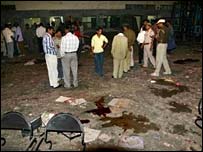
Indian Prime Minister Manmohan Singh has appealed for calm after a series of bomb explosions rocked the northern city of Varanasi on Tuesday.
The government said the main concern was to ensure there was no flare-up of communal violence in the city, an important Hindu holy site. Security has been stepped up with extra police patrols around the bombed areas of the railway station and a temple.
At least 15 people were killed in the blasts and some 60 others were injured. Senior politicians, including Home Minister Shivraj Patil, are travelling to the city. Officials fear the blasts could trigger inter-religious violence.
Though one should take a moment to ponder those who lost their life and look to the politicians to talk tough and attempt to punish those responsible the fact remains that from Iraq's prelude to civil war, the holy-land, on-going civil war in the Sudan and elsewhere in Africa to now once more the Indian sub-Continent, war against society is taking place.
Society not in the philosophical or abstract sense, but society represented by the children killed while going to school, woman murdered at night and men tortured during the day, hourly mortar attacks on market squares and the destruction of holy sites. As is all too often the fact, a minority rules the majority. It is time, finally time, that the majority stand up in every country and say with one voice STOP. It is finally time for the majority to take to the streets and overpower the shouts of protests, rioters, and those who think terror is the correct action. I do not advocate violence, but rather a show of strength that sends a clear signal that violence through intimidation has not worked.
Wednesday, March 01, 2006
Fighting Bob's Death

In the State of Wisconsin, once the beacon of Progressive politics, reform, and ideas saw that very idea killed Tuesday night.
Not surprising, Democrats were very vocal on Tuesday night, saying Republicans were only using the marriage amendment, as a way to drive more conservatives to the polls, though opposition came from some Republicans too.
Supporters of the ban said after the vote that they weren't worried at all about the bipartisan opposition, because of all the bipartisan support for the ban.
What was interesting was not this result; hypocrites and bigots seem to be allowed more time to expell hot air these days, but that the "progressive" or liberal paper of the capital city, The Capital Times side-stepped the issue completely, choosing instead to discuss the potential plight of Wisconsin aged, who co-habitat, but are not gay.
What should be uncomfortable for anyone paying attention to this issue is how the legislature and a single political party is reaching into the state constitution and citizen's lives, forcing an issue that most Wisconsin citizens would rather not worry about. Once upon a time, politicians who achieved this type of self-centered, single-issue advocacy found opposition in men like Bob LaFollette, his son and an army of progressive citizens that dominated state politics during the early 1900's. Tuesday night indicated that all that remains of progressive politics is the myth. As for the state constitution, let this battle for Wisconsin's future, now begin in earnst!
Coca & Curry
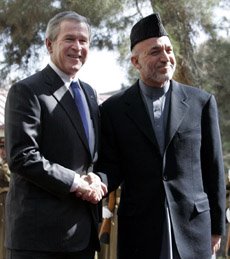
President Bush’s visit to Afghanistan and India highlight the fact that areas of “peace” are not as secure as they should be and “allies” have more than a difference of opinion with the Bush Administration.
Bush's first visit to Afghanistan comes as Karzai's fledgling government struggles with a stubborn Taliban insurgency. In violence since the start of last year, more than 1,500 people, including dozens of U.S. soldiers, have been killed.
Meanwhile, waving black and white flags and chanting anti-Bush slogans, tens of thousands of demonstrators protested in New Delhi against Bush's visit to India, which begins on Wednesday afternoon.
The continued violence in Afghanistan and the protests in New Delhi showcase more than an untamed country and standard anti-American sentiment. These events show current strategy against al Qaeda and mutual support with Afghan citizens still needs refinement and strategy with India’s government spanning sectors of business and defense, the two often intersecting, needs more consideration of the people (citizens) that said policies affect.
Monday, February 27, 2006
Ohio Politics
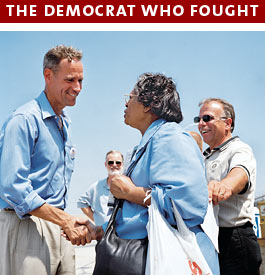
As primary season starts to get under way developments in Ohio made this post possible. The debate within the Democratic Party over the Iraq War is as decisive as the debate that occurred forty years ago with Vietnam.
As the Vietnam War progressed critics of the Johnson Administration’s policy were seen at first as being un-patriotic. As large-scale opposition developed in the later half of the 1960’s, especially after 1968 the debate within the Democratic Party and between Democratic politicians crystallized. A similar event of liner proportions is occurring. After supporting the President and invasion of Iraq due to fear of being called unpatriotic, the Democratic opposition is still trying to play both sides of the argument: opposition to the war and having a plan to conduct the war. While Democrats entangle themselves in debate the Republicans have used this perceived indecision to their collective electoral advantage. If Democrats want to reverse this trend having recent veterans from the War run for office is one of their best options.
Committed veterans who know the realities on the ground and are uniquely insulated from the attack on their patriotism; these are people the Democrat’s need to have in the races. One such Democrat is Paul Hackett. The tough-talking Iraq combat veteran turned a special-election fight in Ohio’s Second District into a political sleeper hit back in 2004. On election night, Hackett pulled 48 percent of the vote in a district where John Kerry got a mere 36 percent. Soon afterward Hackett met several times with Senate Majority Leader Harry Reid and Sen. Chuck Schumer, chair of the Democratic Senatorial Campaign Committee (DSCC), both of whom encouraged him to run for the seat of Ohio’s senior senator, Republican Mike DeWine, in 2006. Hackett agreed after being told by Ohio Congressman Sherrod Brown that he wasn’t planning to run. This spring, Sherrod Brown called informing Hackett he’d changed his mind: he was running after all. Then Schumer called, “Schumer didn’t tell me anything definitive,” he says in a Mother Jones article. “But I’m not a dumb ass, and I know what he wanted me to do.” Hackett says of the Party, “The Democratic Party is like an addict. They’re addicted to failure. I want to help the party. The question is how do you help someone that doesn’t want help?”
The most difficult decision to understand is why support for Hackett has been retracted. It should not be due to his rhetoric, Howard Dean, one-time Democratic presidential hopeful burst into the national spotlight with very similar language and, though, he did win the party’s nomination he is the national chairman. It should not be over the issue of electability. Senior Democrat officials make this explanation irrational by the support, indeed, the request that Hackett run in the first place. The only explanation left is one that is unfortunate, but most likely true. Congressman Brown, after deciding against a Senate run, chose to run and due to prior Congressional experience mixed with internal party politics and a large war chest to spend on a primary, Hackett was forced to step aside for the Party insider.
In side-lining a potential candidate the Democrat’s show that as they are ineffectual in being the honorable Opposition to the Republicans they are ineffectual in choosing candidates that can articulate alternative ideas, strategize and win the hearts of the electorate. An electorate of which, fifty-six percent, in a recent Gallop poll, voiced dissatisfaction with the handling of the war in Iraq. The question is whether or not Brown’s decision was right. Brown says he wouldn’t be giving up a safe congressional seat unless he knew he could beat DeWine, Hackett counters, “If Democrats want to start winning races, they might need a dose of boot-camp discipline: “How come this doesn’t happen in the Republican Party? It’s because they sit down guys like Sherrod and put him in a corner and make him wear the dunce cap.” The question is do Democrats want to win?As long as the Opposition is self-muted, the Republicans will continue the policies that are largely seen as ineffective but are accepted because there is no alternative.
Friday, February 24, 2006
The Bookends
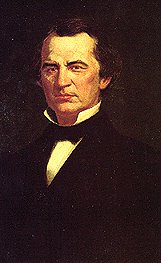
The president was impeached today. Not THE president, but the president that guided America through the early stages of Reconstruction, following the Civil War. President Andrew Johnson, who, like President Clinton was impeached by the House of Representatives, but not convicted by the Senate, though, in Johnson’s case the final vote was very close. One vote saved him from removal.
This being Friday, I find it appropriate to contemplate the historical bookends of this week. On Monday, the nation celebrated President’s Day; a holiday that most adults remember because the mail is not delivered and children know through the mythical Washington and Lincoln. Today should be remembered for the success of the democratic process, though it is not.
When the House of Representatives issued articles of impeachment against President Johnson, uncharted waters were explored. This was the first time that a sitting President was impeached. Democracy in the American tradition is about improvising and compromise. This tradition began with Washington where every action established precedent and carried through with Lincoln who improvised throughout the Civil War.
This tradition was not present when Congress impeached Johnson or over one hundred sixty years later when Congress impeached Clinton. The democratic process however was. The fact that such precedent existed from President Johnson is proof enough.
To paraphrase from The American President, citizenship is not easy. It makes us work for it. As this week closes, it is fascinating to look at two historical bookends and see the true significance in them.
A Deserved Gold

On Thursday night, a graceful display of perfection took place in Turino, Italy. On Tuesday of this week, during the woman's short program for figure skating Shizuka Arakawa, a leader of Japan's female figure skating team, completed her program, walked over off the ice, saw her scores and left. She did not display the business-like attitude of Russia's Irina Slutskava or the self-motivated attitude that America's Sasha Cohen continually muttered to herself. Rather, there was a void of attitude all together.
After the short program on Tuesday night Arakawa was third behind Slutskava and Cohen. After the first two groups went, Cohen skated. She fell, twice. Hamilton and Co. speaking optimistically five minutes previous were reduced to state the obvious. Once again, Cohen had choked. Then Arakawa put her brilliant spins on display and finished a flawless program. The commentary mentioned none of this only cautiousness; giddy expectancy for Slutskava claiming the gold the undertune to every word uttered. When Irina Slutskava took the ice she had truly a golden opportunity, but a sub-par skate, that included a fall, left her with the bronze and shell-shock.
A fan of Olympic skating since boyhood, I was continually confused by the analysis of the new scoring, and would have preferred to mute the commentary of Dick Button, Scott Hamilton, et., al, if not for wanting to listen to the music that accompanied the skaters. What I was most upset about was the lack of constructive i.e. positive commentary on the woman who won the Gold, gave Japan its first gold medal in the games, and Japan's first for the sport. There was no documentary before she skated or after she had won. There was no interview, which I would have at least expected, and the news in today's papers make the win seem more like a gift than hard work. This is more than unfortunate. It poorly serves the Olympic tradition and American tradition for loving hard-won victories. Maybe the reason is because Arakawa's skate in its flawlessness, though deserving of commentary, hide the hard work. I would hope this is the reason. Arakawa made the win look easy, which it was not, and in doing so has shown how an ideal Olympian should be.
Thursday, February 23, 2006
Opportunity in Rubble

More than 100 people are killed in the aftermath of a bomb attack on the al-Askari shrine in Samarra, a key Shia Muslim shrine in Iraq. Everyone in Iraq - and across the Middle East - knows that a full-blown civil war would be much worse. It is for that reason that Jalal Talabani, the President of Iraq, was worried enough to go on television to warn how dangerous such a conflict would be. Iraq does not have a civil war, but it has the makings of one.
Long before the golden dome of the mosque in Samarra was destroyed there were serious incidents, between Iraq's different communities, which involved large loss of life. Though all sides have suffered it is the Shia who have arguably lost the most with thousands of people dead in hundreds of sectarian attacks. In the past twenty-four hours responsible leaders have recognized the danger, and have not allowed their country to slide into the nightmare called Lebanon after 1975. However, the destruction of the al-Askari shrine takes the danger of a civil war in Iraq to a new level and why we all should hold our collective breath.
This bombing has produced bigger protests than the killing of humans did and presumably could multiply the danger and the violence. The reason is that the holy places in the Middle East are very special for the people who consider them sacred, and that applies to all the different religions and sects. These holy places are a vital part of the way that people see themselves. In short, the attack on the shrine was seen as a direct assault on the identity and rights of the entire community.
A lot now depends on the Shia leaders, especially Grand Ayatollah Ali al-Sistani, the top religious leader, and the radical nationalist cleric Moqtada al-Sadr, who broke off a trip to Lebanon to fly home as soon as he heard what had happened in Samarra. They have both called for national unity, and for Shia people to defend themselves if the authorities cannot.
The West should be concerned with the action (bombing) but not the result (protesting). Arab culture is such where it is natural to express rage and sadness, collectively, on the streets. The challenge for Iraqi political and religious leaders is to control and channel the anger, to let it be expressed but not to get out of control. This is where the West should be concerned. If the Iraqi citizen through channeled protests does not show force against the insurgency, in essence, reclaiming the country from them and the Coalition forces, then the cycle of violence will enter a new level, unimaginable till now. Most Iraqis, of all sides, do not want Civil War and why some extremists do, and are trying as hard as they can to make it happen. This is the moment for the Iraqi people to collectively stand up, silent no more, and take what is rightfully for them—their country.
Wednesday, February 22, 2006
U.S. Port control--A foreign matter

Republicans and Democrats are working together to try and stop a deal that would transfer control of six U.S. ports to an Arab company from the United Arab Emirates (UAE).
The Bush administration is facing criticism this week over its decision to let a subsidiary of UAE government-controlled maritime management firm Dubai Ports World run ports in New York and New Jersey; Philadelphia, Pennsylvania; Baltimore, Maryland; Miami, Florida; and New Orleans, Louisiana
The administration argues the deal was properly approved and poses no security threat. Speaking from Air Force One, President Bush said lawmakers need to explain why they have called for the deal to be blocked. The president also threatened to veto any bill that would hold up the agreement.
Does the president really not understand the objection? It is not because a foreign company will operate the port; the U.S. had a deal with a British company do so just that. In politics, the perception of the truth is often accepted than the real thing. In short, image, is very important in expressing the message, spinning the story, and handling damage control.
The image of an Arab (Muslim) country controlling (operating) not one, but six major sea ports as our soldiers fight Arab insurgents in Iraq, that two of the hijackers in the September 11, 2001, attacks came from the UAE and that the hijackers drew funds from bank accounts in Dubai, the financial center of the Persian Gulf, should make anyone wonder what the Administration is thinking? One thing is for certain, the Democrat’s have been handed another weapon in the elections this fall. It will be interesting to see if they will.
Tuesday, February 21, 2006
Unholy protests

Wearing vests covered in military patches, a band of motorcyclists rolls around the country from one soldier's funeral to another, cheering respectfully to overshadow jeers from church protesters.
These bikers calling themselves the Patriot Guard Riders, number more than 5,000 strong, were formed to counter anti-gay protests held by the Rev. Fred Phelps at military funerals.
Rev. Phelps believes American deaths in Iraq are divine punishment for a country that he says harbors homosexuals. His protesters carry signs thanking God for so-called IEDs -- explosives that are a major killer of soldiers in Iraq. The bikers shield the families of dead soldiers from the protesters, and overshadow the jeers with patriotic chants and a sea of red, white and blue flags.
I struggle with trying to decide what is more sad. The funeral, the Christian protestors, or the bikers who make the journey to these funerals and shield mourning families. Rev. Phelps and the protesters, most rational people will agree, are un-Christian, missing the true teaching of Jesus and like with most social issues seen within the moral-social prism today, chose the Old Testiment intrepretation of God rather than one taught by Christ in the New Testiment. It is this misintrepretation that may be the deepest dimension of saddness. The mourning families will have their wounds heal in time. The bikers, remembering the brothers dead in faraway lands and honoring the host of new dead from across the globe, hold their sadness close to the heart, wrapping it around them, like the flag they hold and, like the families, never forgetting. The protesters however will never experience the sadness. Through the language of hate and the action of disrespect they nullify every positive action and word undertaken in the name of Christianity, and add fuel to comparasions of fanatical Islamic minorities.
Wednesday, February 15, 2006
Haitian preference
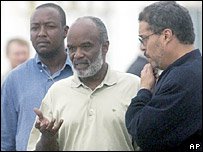
Revolutions bring with it images of blood and death. The sibling suicide of America circa 1775 the guillotined heads in France, Reds against Whites in 1917, the pot marked streets of Madrid, Bucharest and Prague. Revolutions are also known to be the forerunner to civil war.
A revolution took place last week and the world did not take notice. The island nation of Haiti, so often seen as a troubled place politically and economically voted in the first round of presidential and parliamentary elections. The first part of the revolution erupted peacefully. Haitians turned out in record numbers. Some 63% of the 3.5 million registered voters cast ballots, far more than in any other election held since the Duvalier clan was ousted from power in 1986.
The second part of the Revolution was important for what did not happen. After initial confusion around some polling stations, there was little violence on the day of voting. The voters showed a clear preference for Rene Preval, the man who was president from 1996 to 2000 and heads the L'Espwa (The Hope) movement. Unfortunately, Mr Preval has failed by a small margin to win the presidential contest outright. Supporters of Mr Preval have taken to the streets, protesting that he was robbed of an outright victory. They say the "international community" - principally the United States and France - does not want to see him back in power because in the past he has been a loyal supporter of President Jean-Bertrand Aristide. If this is true, the United States should look at Mr. Preval's record.
President Preval's four years in office were a period of relative calm, with some improvements in the Haitian economy, a more or less functioning parliament and efforts to revive local government. More importantly, and most unusual for a politician, Mr Preval kept out of the political violence of 2003-2004, and in the run-up to these elections has stressed that he is now his own man.
By voting in such massive numbers, the Haitian people have shown that they support the political process supervised by the United Nations. The 8,000-strong UN force should continue to maintain the peace over the coming weeks as the second round of voting takes place and the United States should accept the apparent winner--Mr. Preval. In the often dicey Anglo-Haitian relationship, Mr. Preval is the only former Haitian president with a positive record.
Subscribe to:
Posts (Atom)
